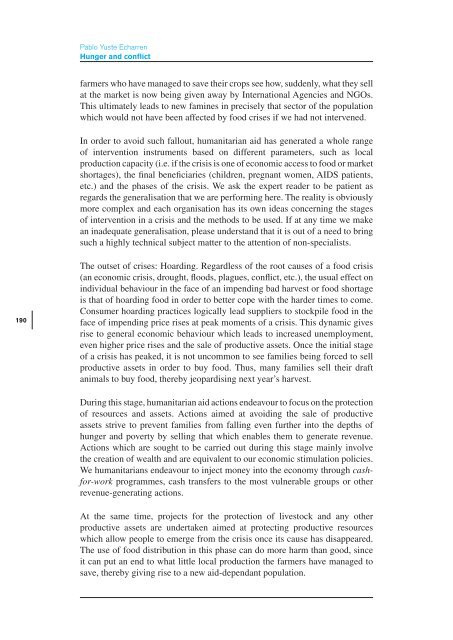Food security and global security - IEEE
Food security and global security - IEEE
Food security and global security - IEEE
- No tags were found...
Create successful ePaper yourself
Turn your PDF publications into a flip-book with our unique Google optimized e-Paper software.
Pablo Yuste EcharrenHunger <strong>and</strong> conflictfarmers who have managed to save their crops see how, suddenly, what they sellat the market is now being given away by International Agencies <strong>and</strong> NGOs.This ultimately leads to new famines in precisely that sector of the populationwhich would not have been affected by food crises if we had not intervened.In order to avoid such fallout, humanitarian aid has generated a whole rangeof intervention instruments based on different parameters, such as localproduction capacity (i.e. if the crisis is one of economic access to food or marketshortages), the final beneficiaries (children, pregnant women, AIDS patients,etc.) <strong>and</strong> the phases of the crisis. We ask the expert reader to be patient asregards the generalisation that we are performing here. The reality is obviouslymore complex <strong>and</strong> each organisation has its own ideas concerning the stagesof intervention in a crisis <strong>and</strong> the methods to be used. If at any time we makean inadequate generalisation, please underst<strong>and</strong> that it is out of a need to bringsuch a highly technical subject matter to the attention of non-specialists.190The outset of crises: Hoarding. Regardless of the root causes of a food crisis(an economic crisis, drought, floods, plagues, conflict, etc.), the usual effect onindividual behaviour in the face of an impending bad harvest or food shortageis that of hoarding food in order to better cope with the harder times to come.Consumer hoarding practices logically lead suppliers to stockpile food in theface of impending price rises at peak moments of a crisis. This dynamic givesrise to general economic behaviour which leads to increased unemployment,even higher price rises <strong>and</strong> the sale of productive assets. Once the initial stageof a crisis has peaked, it is not uncommon to see families being forced to sellproductive assets in order to buy food. Thus, many families sell their draftanimals to buy food, thereby jeopardising next year’s harvest.During this stage, humanitarian aid actions endeavour to focus on the protectionof resources <strong>and</strong> assets. Actions aimed at avoiding the sale of productiveassets strive to prevent families from falling even further into the depths ofhunger <strong>and</strong> poverty by selling that which enables them to generate revenue.Actions which are sought to be carried out during this stage mainly involvethe creation of wealth <strong>and</strong> are equivalent to our economic stimulation policies.We humanitarians endeavour to inject money into the economy through cashfor-workprogrammes, cash transfers to the most vulnerable groups or otherrevenue-generating actions.At the same time, projects for the protection of livestock <strong>and</strong> any otherproductive assets are undertaken aimed at protecting productive resourceswhich allow people to emerge from the crisis once its cause has disappeared.The use of food distribution in this phase can do more harm than good, sinceit can put an end to what little local production the farmers have managed tosave, thereby giving rise to a new aid-dependant population.
















